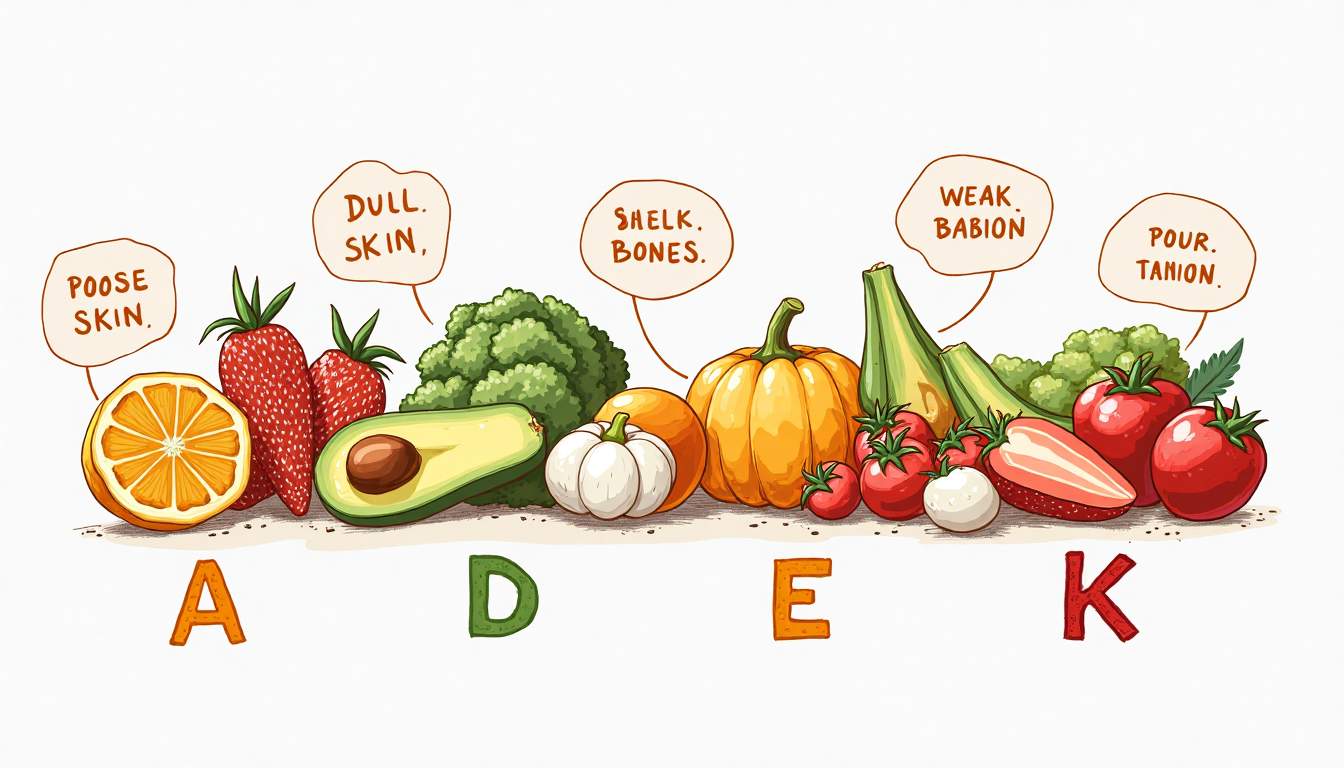Deficiencies in fat-soluble vitamins A, D, E, and K can cause serious health issues such as night blindness, bone weakness, poor immune function, bleeding problems, and neurological symptoms. Early detection is key. Learn the symptoms and how to correct deficiencies through diet and supplementation.
Vitamins A, D, E, and K are essential fat-soluble vitamins that play crucial roles in maintaining overall health. Deficiencies in these vitamins can lead to a range of health issues, some of which can be quite serious. Understanding the signs and symptoms of these deficiencies is vital for early detection and intervention. This article delves into the functions of these vitamins, the risk factors for deficiencies, and the specific symptoms associated with a lack of each vitamin.
Understanding Fat-Soluble Vitamin Deficiencies
Fat-soluble vitamins are absorbed along with dietary fat and stored in the body's fatty tissues and liver. Unlike water-soluble vitamins, which are excreted through urine, fat-soluble vitamins can accumulate in the body, making it essential to maintain a balanced intake. A deficiency in these vitamins can occur due to several factors, including inadequate dietary intake, malabsorption disorders, or certain medical conditions.
How Fat-Soluble Vitamins Function in the Body
Each fat-soluble vitamin has unique functions that are critical for various bodily processes. Vitamin A is vital for vision, immune function, and skin health. Vitamin D is essential for calcium absorption, bone health, and immune support. Vitamin E acts as an antioxidant, protecting cells from oxidative damage, while Vitamin K is crucial for blood clotting and bone metabolism. Understanding these functions helps highlight the importance of maintaining adequate levels of these vitamins. For instance, a deficiency in Vitamin A can lead to night blindness and an increased susceptibility to infections, while insufficient Vitamin D can result in rickets in children and osteomalacia in adults, both of which compromise bone integrity. Furthermore, Vitamin E's role in cellular protection underscores its importance in preventing chronic diseases, including heart disease and certain cancers, by mitigating oxidative stress in the body.
Risk Factors for Developing Deficiencies
Several factors can increase the risk of developing deficiencies in fat-soluble vitamins. Individuals with gastrointestinal disorders, such as celiac disease or Crohn's disease, may have difficulty absorbing these vitamins. Additionally, those following restrictive diets or experiencing malnutrition are at higher risk. Certain medications can also interfere with the absorption of fat-soluble vitamins, leading to potential deficiencies. Recognizing these risk factors is essential for prevention and early intervention. For example, individuals who have undergone weight loss surgery may require careful monitoring and supplementation to ensure they are receiving adequate levels of these vital nutrients. Moreover, aging can also impact the body's ability to absorb fat-soluble vitamins efficiently, necessitating a closer look at dietary habits and potential supplementation in older adults. Regular health check-ups and blood tests can help identify deficiencies early, allowing for timely dietary adjustments or supplementation to restore optimal health.
Recognizing Specific Deficiency Symptoms
Identifying the symptoms of vitamin deficiencies can be challenging, as they often overlap with other health issues. However, being aware of the specific signs associated with deficiencies in vitamins A, D, E, and K can aid in early diagnosis and treatment.

Vitamin A Deficiency: Vision Problems and Skin Changes
Vitamin A deficiency can lead to several noticeable symptoms. One of the most common signs is difficulty seeing in low light, known as night blindness. This occurs because vitamin A is crucial for the production of rhodopsin, a pigment in the retina that helps with night vision. In addition to vision problems, individuals may experience dry skin, rough patches, and an increased susceptibility to infections due to impaired immune function.
Severe vitamin A deficiency can lead to more serious conditions, such as xerophthalmia, which can cause permanent blindness if left untreated. It is important to monitor dietary intake of vitamin A-rich foods, such as carrots, sweet potatoes, and leafy greens, to prevent deficiencies. Furthermore, the role of vitamin A extends beyond vision; it is also vital for cellular communication and the maintenance of healthy skin and mucous membranes. This vitamin also plays a significant role in reproductive health and the development of embryos during pregnancy, underscoring its importance in both maternal and fetal health.
Vitamin D Deficiency: Bone Health and Immune Function
Vitamin D plays a crucial role in maintaining bone health by facilitating calcium absorption. A deficiency can lead to weakened bones, increasing the risk of fractures and conditions like osteoporosis. Symptoms of vitamin D deficiency may include bone pain, muscle weakness, and an increased risk of falls, particularly in older adults.
Moreover, vitamin D is essential for a well-functioning immune system. A deficiency may lead to a higher susceptibility to infections, particularly respiratory illnesses. Sources of vitamin D include sunlight exposure, fatty fish, fortified dairy products, and supplements, making it essential to ensure adequate intake. Recent studies have also suggested that vitamin D may play a role in reducing the risk of chronic diseases such as cardiovascular disease and certain cancers. This highlights the importance of not only recognizing deficiency symptoms but also understanding the broader implications of maintaining optimal vitamin D levels for overall health and well-being. Regular screening, especially for individuals at higher risk, can be a proactive approach to preventing deficiencies and promoting long-term health.
Identifying and Addressing K and E Deficiencies
Vitamin K and E deficiencies, while less common, can also lead to significant health issues. Understanding the symptoms associated with these deficiencies is crucial for maintaining overall health.

Vitamin K Deficiency: Blood Clotting and Bone Metabolism Issues
Vitamin K is primarily known for its role in blood clotting. A deficiency can lead to excessive bleeding and easy bruising, as the body struggles to form clots effectively. Individuals may notice that they bleed more easily from cuts or experience prolonged bleeding after surgery or dental work.
In addition to clotting issues, vitamin K deficiency can affect bone health. It plays a role in bone metabolism, and a lack of this vitamin may lead to an increased risk of fractures. Foods rich in vitamin K include leafy green vegetables, broccoli, and fermented foods, which should be included in a balanced diet to prevent deficiencies. Furthermore, vitamin K is also involved in the regulation of calcium in the bones and blood, highlighting its importance not just for clotting but also for maintaining strong, healthy bones. Some studies suggest that adequate vitamin K intake may even help reduce the risk of osteoporosis, particularly in older adults, making it essential to monitor and ensure sufficient dietary intake throughout life.
Vitamin E Deficiency: Neurological Symptoms and Oxidative Stress
Vitamin E is a powerful antioxidant that protects cells from oxidative stress. A deficiency in vitamin E can lead to neurological symptoms, including muscle weakness, coordination problems, and impaired vision. These symptoms arise because vitamin E is essential for maintaining healthy nerve cells and preventing oxidative damage.
Additionally, individuals with vitamin E deficiency may experience an increased risk of chronic diseases due to the lack of antioxidant protection. Sources of vitamin E include nuts, seeds, and vegetable oils, making it important to incorporate these foods into the diet for optimal health. Beyond its antioxidant properties, vitamin E also plays a role in immune function and skin health. Some research indicates that adequate levels of vitamin E can enhance immune response, particularly in older adults, who may be more susceptible to infections. Moreover, vitamin E is often touted for its skin benefits, as it helps to protect against UV damage and may aid in skin repair processes. Thus, ensuring sufficient vitamin E intake is not only vital for neurological health but also for overall well-being and vitality.
Conclusion
Deficiencies in vitamins A, D, E, and K can lead to a range of health issues, from vision problems and bone health concerns to neurological symptoms and blood clotting disorders. Recognizing the signs and symptoms of these deficiencies is crucial for early diagnosis and treatment. By understanding the functions of these vitamins and the risk factors for deficiencies, individuals can take proactive steps to ensure they maintain adequate levels through a balanced diet and, if necessary, supplementation. Prioritizing health and nutrition is essential for overall well-being, and being informed about vitamin deficiencies is a vital part of that journey.
Support Your Immune System with a Daily Dose of Vitamin C
While vitamins A, D, E, and K are essential, vitamin C is equally critical—especially for immune support, collagen production, and antioxidant protection. If you're concerned about nutritional gaps or looking to enhance your daily wellness routine, consider adding a high-quality vitamin C supplement to your regimen.
Immuno Boost Vit C Complex is designed to naturally support your immune system with a potent blend of vitamin C and bioflavonoids that work synergistically for maximum absorption.
→ Prioritise your immunity and wellbeing - try Immuno Boost Vit C Complex today.

Share:
Best Foods High in Vitamin C for Immunity and Overall Health
Best Vitamins to Prevent and Recover from Colds Naturally